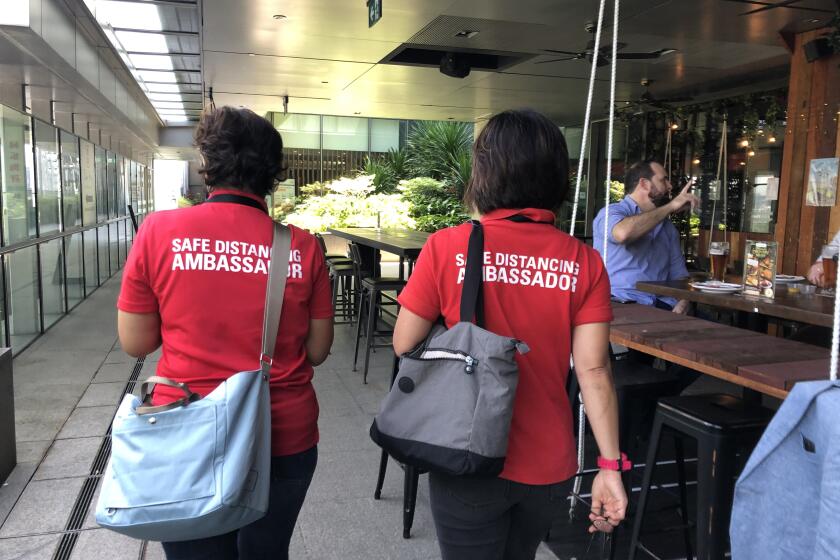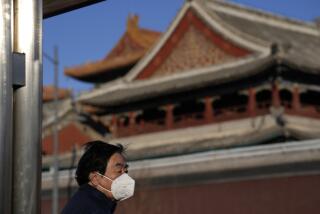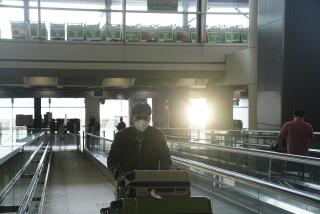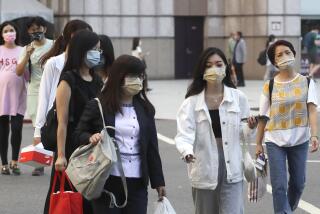Op-Ed: How I found a little slice of COVID-free utopia in Singapore

I recently spent 14 days quarantined in Singapore, as required by the city’s COVID-19 protocols for travelers. This was mandated by a Stay-Home Notice (SHN) from the Immigration Checkpoint Authorities. I was put into a hotel designated by the Singapore Tourism Board, which runs the government’s ground operations for anyone traveling from high-risk countries.
I was a threat to Singapore, having come from the United States, where the coronavirus rages out of control. Singapore’s strict protocols were intended to protect its population from me. Yet it was I who felt safe.
I had not been back in Singapore for seven years, and I was nervous about being quarantined when I boarded my flight from Boston. For Singaporean citizens like me, who left the city before its March coronavirus travel advisories, the government picked up the cost of the mandatory quarantine measures through the end of 2020. Noncitizens — as well as Singaporeans who left the city after March 27 — have to pay fees to cover their quarantine stays and COVID-19 testing.
The quarantine process was airtight. My hotel room had a one-use key. If I left it at any unscheduled time, I would not have been able to reenter and would have violated the quarantine requirements, with serious consequences: Errant travelers may be prosecuted under the Infectious Diseases Act and fined up to $10,000 and/or imprisoned for up to six months.
The hotel’s elevator was locked; it was operated for me only on Day 11 at 10:30 a.m. so that I could go to the 18th-level rooftop to take a COVID-19 test, and again on Day 14 at 12:30 p.m., my time for discharge. Hotel security surveilled the corridors 24/7. Immigration officers checked in on me regularly via WhatsApp or in person at my door.
With a population of more than 5.8 million, Singapore has had around 58,500 COVID-19 cases and 29 deaths. Border control and the bedrock principles of wearing masks, social distancing and avoiding gatherings have worked to contain the spread of the virus; there wasn’t a single local transmission during my 14-day quarantine. Travelers found to have the virus through surveillance at entry points are immediately isolated in a Ministry of Health facility.
Safe distancing ambassadors help ensure Singaporeans are observing health guidelines to maintain the country’s success in curbing cases of COVID-19.
I lived in complete isolation. Before I left Boston, I imagined having plates of food being shoved at me through a dinky sliding door in a windowless cell, like those I’d seen in “The Three Musketeers” as a child. Hearing people talk about “serving” quarantine and “release” from quarantine added to these thoughts.
But the experience was anything but austere. The location for my quarantine was a five-star hotel. The hotels used as SHN facilities range from three to five stars; where you end up being placed is the luck of the draw. Set meals, prepared by the hotel’s chef, were delivered three times a day, placed on a chair outside my door.
My ninth-floor room had floor-to-ceiling windows on two sides that let light in and connected me to the world outside. I kept my daily routines, completing 117 miles from “Walk at Home” videos on YouTube. I finished two books and left them on the chair outside for housekeeping to remove. And I thought a lot about why life in Singapore during the pandemic was so different from life in the U.S.
While I was in quarantine, the headlines in the news showed the U.S. setting records for the number of new cases and deaths every day.
I felt like I was in a COVID-free utopia. Or at least in a place where the threat was minimal and the government was doing everything it could to keep its residents safe. The Ministry of Health Twitter feed regularly posted: “We have confirmed and verified that there are no new cases of locally transmitted COVID-19 infection.” Some would say it’s boring to see the same tweet repeatedly for two weeks. I say it’s wicked good.
Like everyone, I yearn for the time when we will be free from the threat of the virus. I got a taste of that during my two-week quarantine.
Grace Segran was a global nomad and business journalist before settling down in Boston to hone her craft in creative writing.
More to Read
A cure for the common opinion
Get thought-provoking perspectives with our weekly newsletter.
You may occasionally receive promotional content from the Los Angeles Times.











